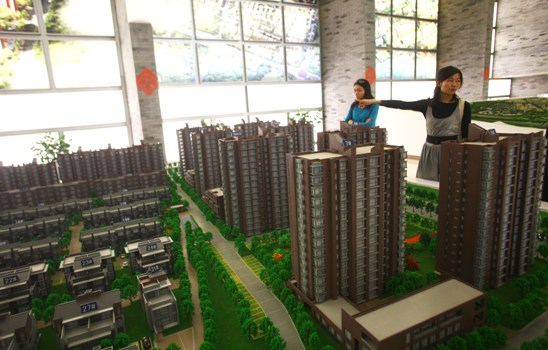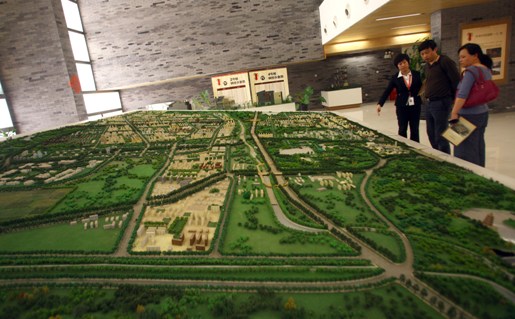Focus
Taxman targets multiple-home owners
By Shen Jingting (China Daily)
Updated: 2010-05-12 07:56
 |
Large Medium Small |
|
Above and below: The sales center of a new property outside Beijing's Fifth Ring Road is almost empty on May 2, two days after some tough property policies were issued to curb the city's skyrocketing housing prices. [Zou Hong / China Daily] |

Beijing set to introduce 'toughest' property policy in history
Beijing is considering a tax on luxury properties or the owners of more than two houses. Such a move, which would be implemented in the second half of the year, would follow the April 30 issuance of property polices that have been called the toughest in the city's history.
Chen Zhi, deputy secretary-general of the Beijing Real Estate Association, said he believes the municipal government will introduce the new property tax soon. Such a tax would be in line with the recent rules made to help curb investment-led demand for housing, believed to be behind much of the surge in prices.
"The government will stick to its policies for a relatively long term, in case there are any potential rebounds in prices," Chen told METRO. "Property taxes can be a good follow-up" to the policies issued on April 30.
The tax is likely to be levied on people who own three or more houses, according to sources in the State Taxation Administration and the Ministry of Finance. Those sources said they did not know when such policy would be issued.
There are two possible ways to collect property taxes from owners of multiple homes, the sources said. One method would be a 12 percent tax on the annual rental income of the house.
The other way is slightly more complicated. The tax bureau would subtract 10 to 30 percent of the sale price, then take 1.2 percent of that balance to arrive at the annual tax. With this method, an individual who buys a 1 million yuan house would pay 8,400 to 10,800 yuan in annual property taxes.
Some experts believe the municipality should also tax luxury apartments, though officials did not provide details about that suggestion.
As early as 1986, the State Council issued interim regulations on property taxes which stated an owner's living space should not be taxed.
However, individuals who have more than two houses now, regardless of the third home's function, may have no choice but to hand over taxes.
Jia Kang, director of the Institute of Fiscal Science Research at the Ministry of Finance, said now is a suitable time for launching a new property tax.
"It would be bad if we introduced a property tax during an economic downturn, because the policy could lead to a rapid drop of the housing market," Jia said.
"But for the moment, our economic growth presents a good situation. If we launch the tax rule now, it would be practical."
Jia pointed out property tax rules should first target the owners of villas or luxury apartments and be gradually expanded to lower-priced apartments.
"We do not want to settle the matter at one go," said Jia, who stressed the process could be gradual.
A property tax can help generate tax revenue for the local government as well as reduce house vacancy rates, Jia added.
Yin Zhongli, a researcher with financial research institution of the Chinese Academy of Social Sciences, said property taxes could play an important role in curbing runaway property prices.
"Many rich people have bought several houses in Beijing," Yin said in a CCTV interview. "Some of the homes are not used, but those men don't want to rent them because the holding cost is zero.
"Their buying activities could be pressed if the property tax really takes effect."
However, some people still expressed doubts about property tax. Chen Yunfeng, secretary-general of the China Real Estate Managers Association, told METRO that he opposes any form of tax regulations.
"House sellers often transfer the tax to homebuyers, demanding that they shoulder all the extra fees," Chen said. "That definitely creates a heavy burden on buyers' capital.
"I think the property market is very sensitive to financial methods, such as raising down payments and suspending loans. Those rules issued by the municipal government recently are good choices."
Zhang Yu, an IT worker in Beijing's Zhongguancun area, said the expected tax policy has already made him anxious.
"I bought a 37 sq m apartment in 2005. When I got married in 2007, my wife and I purchased a 105 sq m house together," Zhang said. But last year, when housing prices continued to rise, Zhang drained his savings and bought a third house.
"My family pays more than 10,000 yuan per month for house loans. If the property tax comes out, we would pay additional money to the government, and that's a big burden on the family," Zhang said. "I would sell one apartment in return for cash."
On April 6, the Ministry of Finance posted its 2010 work focus on its website, stating the perfecting a property tax system is a priority.
In an executive meeting of the State Council on April 14, Premier Wen Jiabao for the first time urged that the authorities quicken the pace to draft rules on taxation, which could lead to a more stable housing market.
What do they say?
Wang Jia

IT engineer, 29
I oppose the tax. First of all, I don't own the land. If I had a permanent residence, I would accept the property tax. However, I only have the right to use it for 70 years. Don't you think it's weird that the government charges this kind of tax?
Though I don't know exactly how they will levy this tax, I expect to pay an extra 30,000 to 50,000 yuan for my family every year. It's a heavy burden, one that my wife and I cannot bear. I heard that some people will fake divorce to avoid this tax, as the policy targets the third or fourth house of every family. But my wife and I will not do this, as it makes marriage a mere game.
Ren Zhiqiang

Chairman of Hua Yuan
Real Estate Group, 59
Each time house prices soar in several cities, "experts" call for a property tax, saying it is the only way to curb such price rises. They claim that compared with taxes in the production and circulation period, a tax on the holding period is really cheap. This leads one person to buy many houses, and gives rise to investment-led demand.
A property tax is a tax imposed on realty owners, and is used to protect the asset's safety and help raise its value. And what is real estate? The international definition is land, or the immovable and permanent buildings on land. But in China, unlike other countries, the land belongs to the country, which means Chinese people don't totally own the property, or they only own it for a limited period. A property tax should be levied on those who own the lands, not those who rent the lands.
I think before we fully resolve the problems in the land system and house ownership, it is not appropriate to start collecting property tax. In China, we are used to "crossing the river by feeling the stones", but today we have already seen too many conflicts, and we cannot adopt this method by delaying conflicts.
Li Daokui

Economics professor at
Tsinghua University, 45
The time for launching a property tax is coming. But the most important thing is to create a mechanism that puts property owners and local government in a benign interaction. The local government should provide people with better public services, and promote public service reform.
In the initial stages, I think the government should launch a pilot project in several large or medium-sized cities. However, it will be hard to curb price rises if we only depend on a property tax, because some people don't care about the extra tax. So it may not achieve its purpose of curbing speculation.
The fundamental solution would be to change the situation whereby local government depends too much on the property industry.

Zhang Dawei
Researcher at Centaline China, 29
If the government sticks to, and properly carries out previous policies, I don't think we will need a property tax to curb price rises. To be frank, some people's houses are for renting, and the tax would raise the rent. This charge will ultimately be transferred to consumers.








